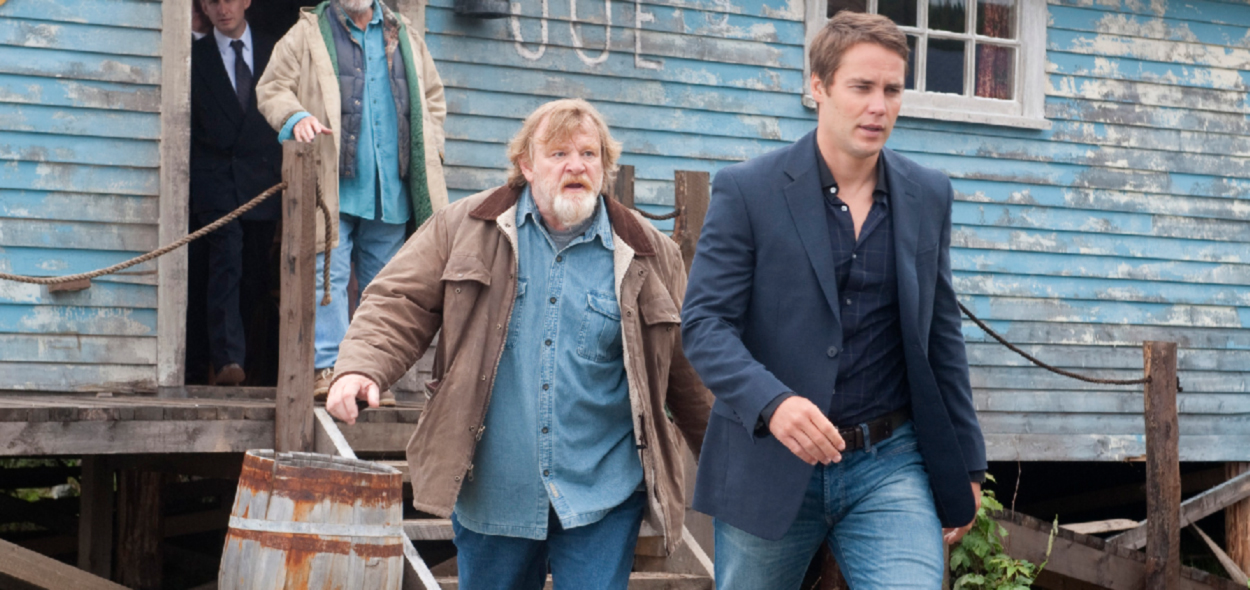
The Grand Seduction opens with a romantic, soft focus oil-painting-esque tribute to the good old days when men were men, who rose early and worked like men, fishing the harbour in Newfoundland and accompanied by a nostalgic voice over by Gleeson. When they returned home for the day, the men got the sex that they deserved, and the town echoed with the sound of orgasms all round. Of course, in the present day, things aren’t so great – Gleeson’s Murray gets up only to cash his welfare cheque, and that of a dead friend that he keeps claiming, along with all the other out of work fishermen in the harbour. The once tight community has dissipated since the fishing dried up. His wife (Cathy Jones), for the most part unnamed, has been offered a job in St John’s, but like any red-blooded man, Murray isn’t comfortable with the idea of his wife working. The town is pitching to have a petrochemical factory built in the town, but requires a town doctor and a “personal assurance”, or bribe, to secure it. Luckily for them, the mayor who has recently left the town to work as a customs officer comes across Dr Paul Lewis (Taylor Kitsch), a cricket-loving plastic surgeon with a penchant for cocaine that lands him in deep with customs. In order to beat the rap, Paul has to serve one month as the town doctor, and Murray tries to rally the town in order to convince him to stay in that time. They learn to play cricket, pretend to like jazz, leave money around for him to find on the ground, and even try to convince the attractive young postmistress Kathleen (Liane Balaban) to flirt with him. They also bug his house in order to learn how best to seduce him. Paul is engaged to Helen (Anna Hopkins) back home but, despite missing her desperately, finds himself falling in love with the town and finding in Murray the father he never had. At the same time the town is also attempting to deceive the oil company into thinking that they have enough people to sustain the factory and enough funds to provide an “assurance”. But the more the town becomes attached to Paul, the guiltier they feel about deceiving him, and as the deadline for the factory pitch approaches, they have to decide which they care about more.
The Grand Seduction is an English-language adaptation of the 2003 French comedy Le Grande Seduction, and begs the very important question – why bother? Continuing the increasingly frustrating trend of translating and adapting any mildly successful and palatable foreign language film, particularly Quebecois output (such as Ken Scott’s Starbuck, which became the tepidly received Vince Vaughn vehicle Delivery Man – coincidentally Ken Scott was also behind Le Grande Seduction), Don McKellar’s film feels entirely unnecessary, regularly pointless and for the most part a needless exercise that wastes quite reasonable talent. Gleeson (with an inexplicably still-Irish accent, despite the Canadian setting) and Kitsch turn in good performances of bad writing and badly executed scenarios, where the comedy falls somewhere between awkward silence and slapstick and never quite feels comfortable in its own skin. They sell the film on the charm that it doesn’t have, and give momentum and credibility to scenes that reach new levels of cringe.
The cringe goes further – the film’s take on sex and gender politics starts out with the submissive bliss of the town’s wives giving themselves to their deserving husbands, and doesn’t improve much from there. Everything from the intent to use Kathleen to actually physically seduce Paul, to Murray’s own insecurity in his own masculinity following his wife’s employment, reeks of causal and deeply entrenched misogyny passed over as rustic charm. All this would be acceptable if the film was simply using all this to make a point about this misogyny – if Murray was shown to be sad and insecure, or Kathleen was shown as a character in her own right, not just eye-candy. Instead, the film’s resolution comes with Murray fetching his wife from her workplace in St John’s and telling her that it’s time to come home – she does go on to work in the factory with Murray, where he gets to grope her at work to his heart’s content. The film ends back where it began, with the submissive joy of the wives once again giving themselves to their now-deserving husbands, living prizes and rewards for their hard work. It’s unsettling in its romanticism, as entitlement to the female body is subsumed into a romantic-comedy resolution.
Overall the film’s premise is quite sweet – in trying to convince someone to love their town, the residents rediscover their pride and love of place, and are able to return to a way of life of which they can be proud. The execution is anything but, regularly sacrificing genuine moments and good performances from the leads for cheap and easy jokes, and perpetrating unnervingly sexist undertones, coupled with a sense of superfluousness that leaves little to be desired.
Around the Staff:
| Conor Bateman |
